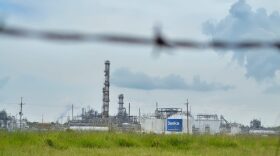-
As the Trump administration sheds staff and funding at the U.S. Environmental Protection Agency, a new analysis places Louisiana among states that have notably slashed their pollution regulation resources even as industry expands
-
Representatives for the locally-owned Smitty’s said the EPA and the LDEQ will still offer guidance as they resume control of the now charred and empty site.
-
Gov. Landry says residents should wait to clean property until toxicity tests are complete.
-
After a proclamation from President Donald Trump, two facilities located in LaPlace, Louisiana will be allowed to ignore federal regulations meant to curb harmful pollutants.
-
The American Lung Association's latest "State of the Air" report shows air quality has worsened in some Gulf South metro areas.
-
Fossil fuel interests like carbon capture — it helps them drill more oil and emit less greenhouse gas. Homeowners say, "Not in my backyard."
-
Communities living and learning near petrochemical plants will face more pollution and less federal protection under Trump’s new policies.
-
The future of millions of dollars in funding to help low-income Louisiana residents access solar energy has grown increasingly uncertain as the Trump administration attempts to slash grant programs awarded under its predecessor.
-
Groups now worry about FBI probes as they struggle to rebound from federal spending freeze enacted under President Donald Trump.
-
The Trump administration plans to drop a federal lawsuit against a synthetic rubber manufacturer accused of worsening cancer risks for residents near its Louisiana plant, according to two sources familiar with the matter.

Play Live Radio
Next Up:
0:00
0:00
Available On Air Stations










